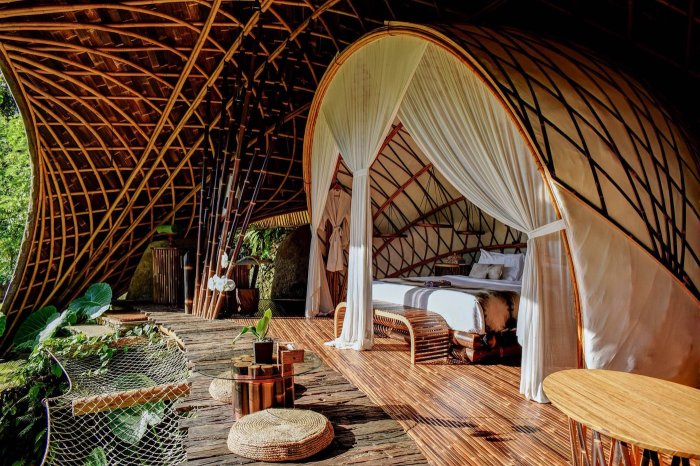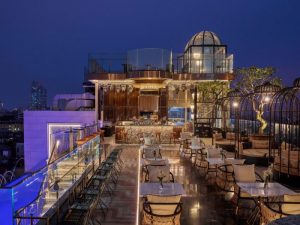
Step into a world of sustainable luxury with Eco-friendly boutique hotels, where eco-conscious practices meet high-end hospitality to create a unique and unforgettable guest experience. This topic delves into the innovative ways boutique hotels are embracing sustainability, offering insights into their design, green initiatives, guest amenities, community engagement, and more.
Eco-friendly Boutique Hotels
An eco-friendly boutique hotel is a lodging establishment that prioritizes sustainability and environmental consciousness in its operations and design.
Importance of Sustainability in the Hospitality Industry
Sustainability is crucial in the hospitality industry as it helps in reducing the carbon footprint, conserving resources, and promoting responsible tourism practices. By implementing eco-friendly initiatives, hotels can contribute to environmental protection and create a positive impact on the planet.
Examples of Eco-friendly Practices in Boutique Hotels
- Utilizing energy-efficient lighting and appliances
- Implementing water-saving measures such as low-flow toilets and showers
- Sourcing organic and locally-produced food for on-site restaurants
- Using eco-friendly cleaning products and amenities
- Offering recycling and waste management programs for guests
Enhancing Guest Experience with Eco-friendly Features
Guests staying at eco-friendly boutique hotels can enjoy a unique experience that focuses on sustainability and environmental awareness. Features such as natural decor, green spaces, and eco-conscious amenities not only provide a tranquil and healthy environment but also educate guests on the importance of sustainable living.
Design and Architecture
Eco-friendly boutique hotels are known for their sustainable design elements that prioritize environmental conservation and reduce carbon footprint. These hotels incorporate various eco-friendly practices in their architecture to create a unique and environmentally responsible space.
Use of Renewable Materials
In eco-friendly boutique hotels, sustainable design often involves the use of renewable materials in construction and decor. This includes materials such as bamboo, reclaimed wood, recycled glass, and organic fabrics. By opting for renewable materials, these hotels minimize their impact on the environment and promote a more eco-conscious approach to hospitality.
Natural Lighting and Ventilation
One key aspect of eco-friendly hotel design is the strategic use of natural lighting and ventilation. Large windows, skylights, and open-air spaces are incorporated to maximize natural light and airflow, reducing the need for artificial lighting and air conditioning. This not only saves energy but also creates a more inviting and comfortable atmosphere for guests.
Impact of Architecture on Sustainability
The architecture of a boutique hotel plays a crucial role in its overall sustainability. By integrating green building practices, such as energy-efficient design, passive solar heating, and green roofs, eco-friendly hotels can significantly reduce their energy consumption and carbon emissions. Sustainable architecture not only benefits the environment but also enhances the guest experience by providing a tranquil and eco-conscious setting.
Green Initiatives and Practices
Eco-friendly boutique hotels are known for their commitment to sustainability through various green initiatives and practices. These establishments go above and beyond to minimize their environmental impact while providing a luxurious and comfortable experience for guests.
Energy-Efficient Practices
Energy efficiency is a top priority for eco-friendly boutique hotels. Many of these establishments utilize solar panels to harness renewable energy and reduce reliance on traditional electricity sources. LED lighting is also commonly used throughout the hotel to lower energy consumption and minimize greenhouse gas emissions. In addition, geothermal heating systems are implemented to efficiently regulate indoor temperatures without relying on fossil fuels.
Water Conservation Measures
Water conservation is another key focus for eco-friendly boutique hotels. Low-flow fixtures are installed in bathrooms and kitchens to reduce water usage without compromising guest comfort. Greywater recycling systems are also implemented to treat and reuse wastewater for non-potable purposes, further minimizing water wastage and promoting sustainable practices.
Waste Management and Recycling Programs
Eco-friendly boutique hotels prioritize waste management and recycling to reduce their ecological footprint. Comprehensive recycling programs are in place to properly sort and recycle materials like paper, glass, plastic, and metal. Additionally, these hotels often compost organic waste to divert it from landfills and promote soil health. By implementing these waste management practices, eco-friendly boutique hotels contribute significantly to sustainability efforts and environmental conservation.
Guest Experience and Amenities
Staying at an eco-friendly boutique hotel offers guests a unique experience that goes beyond just accommodation. These hotels prioritize sustainability and environmental consciousness, providing guests with a chance to stay in a place that aligns with their values.
Eco-Friendly Amenities
One of the ways eco-friendly boutique hotels enhance guest experience is through the use of organic toiletries and locally sourced products. These amenities not only reduce the carbon footprint but also support local communities and promote health and well-being.
- Organic Toiletries: Guests can enjoy luxurious bath products that are free from harmful chemicals and made from natural ingredients, promoting a sense of relaxation and eco-consciousness.
- Locally Sourced Products: From bedding to decor, eco-friendly boutique hotels often showcase products that are sourced locally, supporting artisans and reducing transportation emissions.
Sustainable Food and Beverage Practices
Guests can also experience sustainable practices in the food and beverage offerings at eco-friendly boutique hotels. One popular trend is farm-to-table dining, where ingredients are sourced directly from local farms, ensuring freshness and reducing the environmental impact of food production.
- Farm-to-Table Dining: By offering farm-fresh ingredients in their menus, eco-friendly boutique hotels provide guests with healthy, flavorful meals while supporting local farmers and reducing food miles.
- Seasonal Menus: Many eco-friendly hotels change their menus with the seasons to promote sustainability, offering dishes made with locally available produce that are at their peak freshness and flavor.
Guest Participation in Sustainability Efforts
Guests can actively participate in the hotel’s sustainability efforts, further enhancing their experience and making a positive impact on the environment during their stay.
- Reuse and Recycle: Guests are encouraged to recycle and minimize waste by using designated bins and reusable items provided by the hotel.
- Eco-Friendly Activities: Some hotels offer eco-friendly activities such as beach clean-ups, nature hikes, or sustainability workshops, allowing guests to engage with the local environment and learn more about conservation efforts.
Community Engagement and Social Responsibility

Community engagement and social responsibility are crucial aspects of eco-friendly boutique hotels. These establishments go beyond just being environmentally conscious by actively participating in initiatives that benefit the local community.
Local Community Partnerships
- Eco-friendly boutique hotels often collaborate with local organizations dedicated to environmental conservation. These partnerships help in implementing sustainable practices and promoting eco-friendly initiatives within the community.
- By working together with local groups, boutique hotels can contribute to the preservation of natural resources, protection of wildlife, and overall improvement of the environment in the area.
Supporting Social Causes
- Boutique hotels can support social causes by organizing charity events, fundraisers, or donation drives within the community. This not only raises awareness about important issues but also provides tangible support to those in need.
- Through these efforts, eco-friendly boutique hotels demonstrate their commitment to social responsibility and show that they are actively engaged in making a positive impact beyond their own operations.
Community Outreach Programs
- Examples of community outreach programs that eco-friendly boutique hotels may participate in include beach clean-ups, tree planting campaigns, and educational workshops on sustainability and environmental conservation.
- These programs not only benefit the local community directly but also help in fostering a sense of environmental stewardship among guests, staff, and residents in the area.
Boutique Hotel Concept

When it comes to boutique hotels, it’s all about creating a unique and intimate experience for guests. These establishments are known for their personalized service, attention to detail, and distinct design elements that set them apart from traditional chain hotels.
Unique Characteristics of Boutique Hotels
- Boutique hotels are typically smaller in size, offering a more intimate setting for guests.
- Each boutique hotel has its own unique style and personality, reflecting the vision of the owner or designer.
- Guests can expect personalized service and attention to detail, with staff often going above and beyond to cater to individual needs.
Significance of Design and Ambiance
The design, decor, and ambiance of a boutique hotel play a crucial role in creating a memorable guest experience. From carefully curated furnishings to thoughtfully designed spaces, every detail is considered to enhance the overall atmosphere.
From eco-friendly design elements to community outreach programs, Eco-friendly boutique hotels are redefining the concept of luxury travel. Embrace sustainability without compromising on comfort and style, making your next stay not just a getaway, but a conscious choice towards a greener future.
FAQ Summary
What sets Eco-friendly boutique hotels apart from traditional hotels?
Eco-friendly boutique hotels focus on sustainability, offering unique guest experiences and amenities that prioritize eco-conscious practices.
How do eco-friendly features enhance the guest experience?
Eco-friendly features like organic toiletries and sustainable food options provide guests with a sense of well-being and environmental responsibility.
What are some common green initiatives implemented by these hotels?
Green initiatives may include energy-efficient practices, water conservation measures, waste management programs, and community engagement projects.





